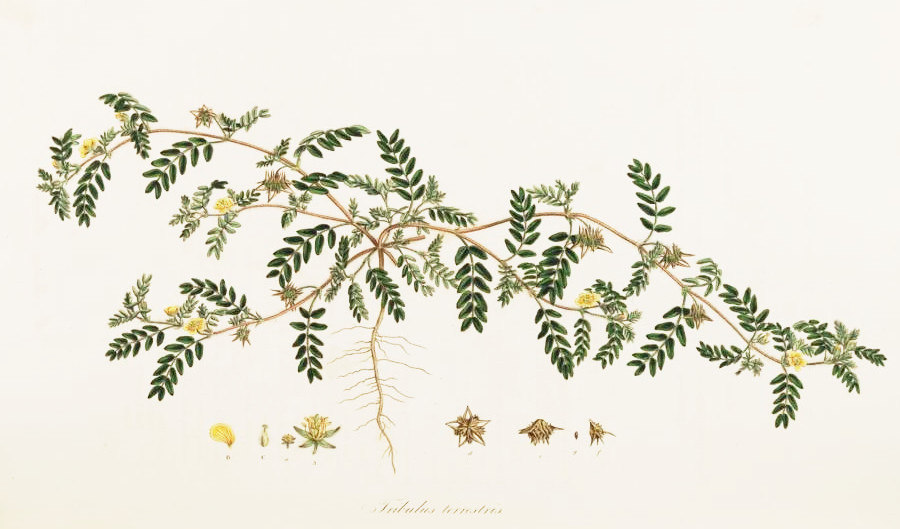Tribulus terrestris L. - Zygophyllaceae - 蒺藜 ji li (chin.), caltrop, cat's head, puncturevine, Erd-Burzeldorn, Erdsternchen
Prostrate annual herb, mat-forming, native to Africa, Asia, and southern Europe, naturalized elsewhere; leaves pubescent, short petioled, even-pinnately compound, opposite, leaflets opposite, oblong, pubescent on the lower surface and the midrib of the upper surface; flowers yellow, 8-10 mm wide, solitary from the axils of the small leaves, peduncles 2-15 mm long, petals yellow; fruit 1cm thick, splitting at maturity into 5 segments each with a line of horny processes down the back and 2 lateral spines toward the center.
http://www.efloras.org/florataxon.aspx?flora_id=2&taxon_id=200012418
„The plant is widely naturalised in the Americas and also in Australia south of its native range. In some states in the United States, it is considered a noxious weed and an invasive species… The extract is claimed to increase the body's natural testosterone levels and thereby improve male sexual performance and help build muscle. Its purported muscle-building potential was popularized by American IFBB bodybuilding champion Jeffrey Petermann in the early 1970s. However, T. terrestris has failed to increase testosterone levels in controlled studies.“
https://en.wikipedia.org/wiki/Tribulus_terrestris
Aerial parts of Tribulus terrestris contain steroidal saponins like protodioscin, 5,6-dihydroprotodioscin, neoprotodioscin.
[Furostanol saponins from Tribulus terrestris., De Combarieu, E., Fuzzati, N., Lovati, M., Mercalli, E., Fitoterapia, vol.74(6), 2003, 583-591]
„Tribulus terrestris is an herbal nutritional supplement that is promoted to produce large gains in strength and lean muscle mass in 5-28 days. Although some manufacturers claim T. terrestris will not lead to a positive drug test, others have suggested that T. terrestris may increase the urinary testosterone/epitestosterone (T/E) ratio, which may place athletes at risk of a positive drug test. The purpose of the study was to determine the effect of T. terrestris on strength, fat free mass, and the urinary T/E ratio during 5 weeks of preseason training in elite rugby league players. Twenty-two Australian elite male rugby league players (mean +/- SD; age = 19.8 +/- 2.9 years; weight = 88.0 +/- 9.5 kg) were match-paired and randomly assigned in a double-blind manner to either a T. terrestris (n = 11) or placebo (n = 11) group. All subjects performed structured heavy resistance training as part of the club's preseason preparations. A T. terrestris extract (450 mg[middle dot]d-1) or placebo capsules were consumed once daily for 5 weeks. Muscular strength, body composition, and the urinary T/E ratio were monitored prior to and after supplementation. After 5 weeks of training, strength and fat free mass increased significantly without any between-group differences. No between-group differences were noted in the urinary T/E ratio. It was concluded that T. terrestris did not produce the large gains in strength or lean muscle mass that many manufacturers claim can be experienced within 5-28 days. Furthermore, T. terrestris did not alter the urinary T/E ratio and would not place an athlete at risk of testing positive based on the World Anti-Doping Agency's urinary T/E ratio limit of 4:1.“
[The effect of five weeks of Tribulus terrestris supplementation on muscle strength and body composition during preseason training in elite rugby league players., Rogerson, S., Riches, C.J., Jennings, C., Weatherby, R.P., Meir, R.A., Marshall-Gradisnik, S.M., The Journal of Strength & Conditioning Research, Vol.21(2), 2007, 348-353]
„Hormonal effects of Tribulus terrestris (TT) were evaluated in primates, rabbit and rat to identify its usefulness in the management of erectile dysfunction (ED). TT extract was administered intravenously, as a bolus dose of 7.5, 15 and 30 mg/kg, in primates for acute study. Rabbits and normal rats were treated with 2.5, 5 and 10 mg/kg of TT extract orally for 8 weeks, for chronic study. In addition, castrated rats were treated either with testosterone cypionate (10 mg/kg, subcutaneously; biweekly for 8 weeks) or TT orally (5 mg/kg daily for 8 weeks). Blood samples were analyzed for testosterone (T), dihydrotestosterone (DHT) and dehydroepiandrosterone sulphate (DHEAS) levels using radioimmunoassay. In primates, the increases in T (52%), DHT (31%) and DHEAS (29%) at 7.5 mg/kg were statistically significant. In rabbits, both T and DHT were increased compared to control, however, only the increases in DHT (by 30% and 32% at 5 and 10 mg/kg) were statistically significant. In castrated rats, increases in T levels by 51% and 25% were observed with T and TT extract respectively that were statistically significant. TT increases some of the sex hormones, possibly due to the presence of protodioscin in the extract. TT may be useful in mild to moderate cases of ED.“
[The hormonal effects of Tribulus terrestris and its role in the management of male erectile dysfunction – an evaluation using primates, rabbit and rat., Gauthaman, K., Ganesan, A.P., Phytomedicine, Vol.15(1), 2008, 44-54]

Sibthrop, J., Smith, J.E., Flora Graeca, vol. 4: p. 65, t. 372 (1823)
http://www.plantillustrations.org/species.php?id_species=1026493